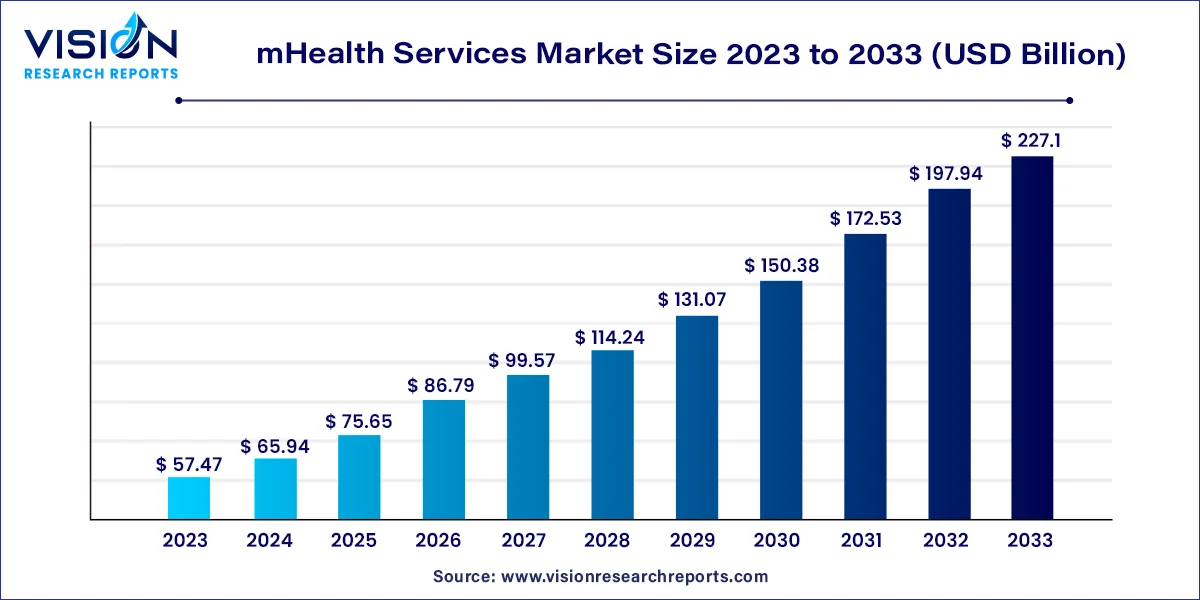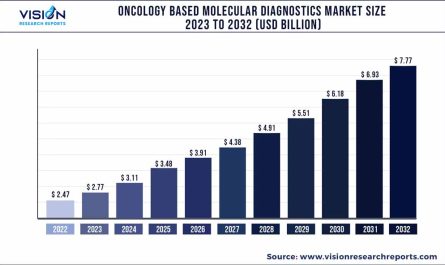The global mHealth services market was surpassed at USD 57.47 billion in 2023 and is expected to hit around USD 227.1 billion by 2033, growing at a CAGR of 14.73% from 2024 to 2033.

Introduction to mHealth Services Market
Mobile Health, or mHealth, refers to the use of mobile devices such as smartphones, tablets, and wearable devices to support healthcare practices and provide medical services remotely. The mHealth services market has witnessed significant growth in recent years, driven by advancements in technology, increasing smartphone penetration, and the rising demand for convenient healthcare solutions.
Evolution of mHealth Services
The concept of mHealth has evolved rapidly, starting from simple applications for health and wellness tracking to more complex solutions involving telemedicine, remote patient monitoring, and health information exchange. With the integration of artificial intelligence and IoT (Internet of Things) technologies, mHealth services have become more sophisticated and capable of addressing various healthcare needs.
Get a Sample@ https://www.visionresearchreports.com/report/sample/41252
Growth Opportunities and Trends in the mHealth Market
- Adoption of Artificial Intelligence (AI) and Machine Learning:
Advancements in AI and machine learning algorithms are revolutionizing healthcare delivery by enabling personalized diagnostics, treatment recommendations, and predictive analytics. AI-powered chatbots and virtual health assistants are enhancing patient engagement and streamlining administrative tasks for healthcare providers. - Proliferation of Wearable Health Devices:
The growing popularity of wearable devices such as smartwatches, fitness trackers, and biosensors is fueling the demand for mHealth solutions. These devices offer real-time monitoring of vital signs, physical activity, and sleep patterns, empowering individuals to track their health metrics and adopt healthier lifestyles. - Focus on Telemedicine and Virtual Care Solutions:
Telemedicine and virtual care have emerged as essential components of modern healthcare delivery, especially in remote and underserved areas. The COVID-19 pandemic accelerated the adoption of telehealth services, driving investments in teleconsultation platforms, remote patient monitoring systems, and digital health apps. - Integration of Internet of Things (IoT) Technologies:
The Internet of Things (IoT) is playing a pivotal role in connecting medical devices, sensors, and wearable technologies to create interconnected healthcare ecosystems. IoT-enabled devices facilitate remote patient monitoring, medication adherence tracking, and personalized health interventions, leading to improved patient outcomes and operational efficiencies. - Emphasis on Data Analytics and Population Health Management:
Healthcare organizations are increasingly leveraging data analytics tools and population health management platforms to derive actionable insights from large volumes of health data. By analyzing patient demographics, clinical outcomes, and utilization patterns, providers can identify high-risk populations, optimize care delivery, and implement preventive interventions to reduce healthcare costs and improve population health outcomes. - Expansion of Mobile Health Applications:
The proliferation of smartphones and mobile apps has democratized access to healthcare information and services, empowering individuals to manage their health and wellness proactively. Mobile health applications offer a wide range of functionalities, including symptom tracking, medication management, teleconsultations, and mental health support, catering to diverse healthcare needs and preferences.
Advantages of mHealth Services
- Convenience and Accessibility: mHealth services enable patients to access healthcare professionals and resources from anywhere at any time, reducing the need for physical visits to healthcare facilities.
- Cost-Effectiveness: By leveraging existing mobile infrastructure, mHealth services can significantly lower healthcare costs, especially for remote patient monitoring and management.
- Remote Monitoring and Management: Patients with chronic conditions can benefit from continuous monitoring and remote management through mHealth solutions, leading to better health outcomes and reduced hospitalizations.
- Improved Patient Engagement: mHealth applications encourage active participation from patients in managing their health, leading to increased adherence to treatment plans and better health literacy.
Challenges in the mHealth Industry
Data Security and Privacy Concerns: The use of mobile devices for healthcare purposes raises concerns about the security and privacy of patient data, necessitating robust encryption and compliance with data protection regulations.
Regulatory Compliance: mHealth services must comply with various regulations and standards, including HIPAA (Health Insurance Portability and Accountability Act) in the United States, to ensure patient safety and data integrity.
Interoperability Issues: Integration with existing healthcare systems and interoperability between different mHealth platforms remain significant challenges, hindering seamless data exchange and communication between healthcare providers.
Limited Connectivity in Rural Areas: In regions with poor network coverage and limited access to high-speed internet, the effectiveness of mHealth services may be compromised, exacerbating healthcare disparities.
Read More: https://www.heathcareinsights.com/extracorporeal-membrane-oxygenation-cannula-market/
mHealth Services Market Key Companies
- Apple Inc.
- Google Inc.
- AirStrip Technologies, Inc.
- Samsung Electronics Co. Ltd.
- Veradigm LLC (Allscripts Healthcare Solutions)
- Qualcomm Technologies, Inc.
- Vodafone Group Plc.
- AT&T
- Telefónica S.A.
- SoftServe Inc.
- Orange
Recent Developments
- In March 2023, Apple Inc. unveiled its strategy to enhance digital health by revealing plans to upgrade AirPods with new health tracking functionalities. These enhancements are set to include temperature monitors, motion detectors, and biometric sensors capable of detecting perspiration and heart rate. The company aims to implement these features by the year 2025.
- In January 2023, Garmin Ltd. launched the Instinct Crossover Series in India. This new series offers Garmin’s comprehensive wellness features, encompassing health monitoring activities, sleep scores, and advanced sleep monitoring capabilities.
mHealth Services Market Segmentations:
By Service
- Monitoring services
- Diagnosis services
- Healthcare systems strengthening services
- Others
By Participants
- Mobile operators
- Device vendors
- Content players
- Healthcare providers
By Application
- General healthcare & fitness
- Medication information
- Healthcare management
- Others
By End-user
- Healthcare providers
- Patients
- Others
By Region
- North America
- Europe
- Asia Pacific
- Latin America
- Middle East & Africa
Buy this Premium Research Report@ https://www.visionresearchreports.com/report/checkout/41252
You can place an order or ask any questions, please feel free to contact sales@visionresearchreports.com| +1 650-460-3308

